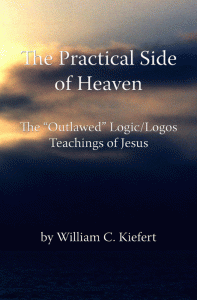
Copyright William C. Kiefert. All Rights Reserved.
Originally written on March 27, 2001.
Excerpted from “Spiritual Logic” by William C. Kiefert: Spiritual logic is the missing link between mind and spirit. I propose that an assumed principle, and the laws of logic it justifies, is the cause behind the judgmental character of civilized man’s “method” of reasoning. It is this principle that pits mind against spirit.
Summary
The power of prayer, meditation, spiritual knowledge, science and our own experiences demonstrate that our thoughts have, within them, the power to create our everyday reality. Prayers, meditation, hypnotism, and the paranormal introduce us to our latent creative powers. Spiritual logic is the key to unlock those potentials so that everyone might use them on an everyday basis.
In the past, we have not been able to harmonize the judgmental nature of our reasoning mind with the nonjudgmental nature of spiritual values. Even the wisdom of the wisest of us is more often than not at odds with our spiritual values.
Ancient Greek philosophers refer to this dilemma as the paradox of two minds in one head. Others refer to this dilemma as the conflict between mind and heart, spirit and flesh, and/or religion and reason.
Spiritual logic overcomes the discord between mind and spirit. It expands our potentials of reasoning by adding a nonjudgmental method of relating ideas that is in harmony with spiritual values. Traditionally, spiritual values could not be rationalized in the context of judgmental rules for correct reasoning. Spiritual logic, however, creates a nonjudgmental method of reasoning that supports spiritual values.
Spiritual logic can be considered the common ground for solving personal and world problems. The need to feed the children, free the oppressed, save the whales, and stop the misuse of nuclear materials and political power would disappear if the fears and selfishness that judgmental reasoning breeds gave way to the unconditional love and caring spiritual logic justifies. The point is that if organizations created to make the world a better place recognized that judgmental reasoning was the common denominator of our problems, we could work together to solve this one problem—thereby solving all the rest.
Spiritual logic is not a quick fix for personal and world problems. We need to debate the principle that some classes have more than one nature—and create new rules of logic and language based on that principle. After which, we need to teach these new rules to our children on a global scale. I consider nonjudgmental reasoning the 4th R of education. Is not learning how to reason nonjudgmentally/lovingly as important to our children’s happiness as is reading, writing and arithmetic?
We stand on the edge of a revolution in consciousness as momentous as any in history. We are but one thought away from that revolution—namely, recognizing that spiritual logic is warranted by the principle that some classes have more than one nature. I believe this one thought is the most important idea for this millennium. How we address this thought will determine the nature of our philosophies of life, and in turn, the character of the future.
###
